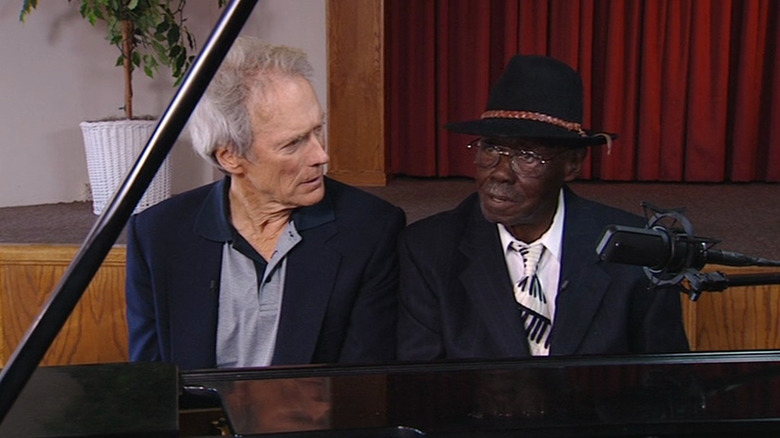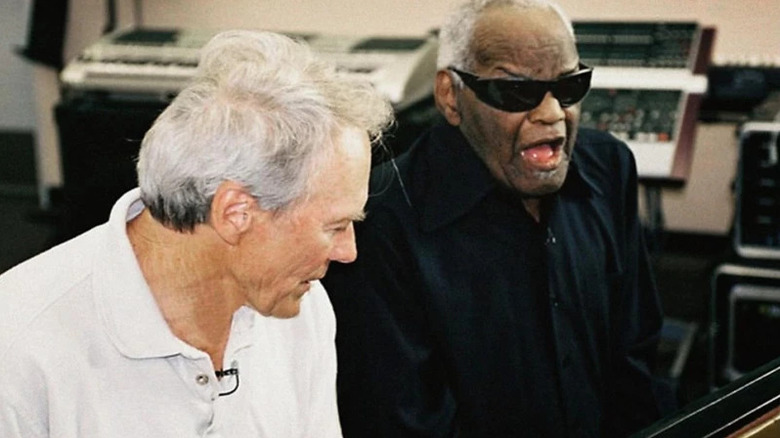The Only Time Clint Eastwood And Martin Scorsese Ever Collaborated
In 2003, Martin Scorsese was cooling off after his long-in-the-making epic "Gangs of New York." Although that film was nominated for 10 Academy Awards, some of Scorsese's fans now consider "Gangs of New York" to be an overstuffed film that took way too much time to percolate (Scorsese had initially envisioned the project back in 1970). After fighting so hard to get "Gangs of New York" made and bearing the publicity whirlwind around its Oscars campaign, Scorsese needed a rest.
Scorsese rested in the way an active and prolific director rests: he churned out another project. 2003 saw the release of a multipart documentary series called "The Blues," which Scorsese produced and directed the first episode of. "The Blues" was a seven-episode film cycle, with each chapter detailing a different corner of the vast American Blues experience. Each episode was helmed by a different famous director. The series aired on PBS in September and October over the course of seven nights.
Many, many, many notable musicians were interviewed for the project, and a lot of vintage clips were discovered and cut into the various movies. The first episode, as noted, was helmed by Scorsese and was called "Feel Like Going Home." That film featured interviews with Keb' Mo', John Lee Hooker, Taj Mahal, Ali Farka Touré, and Corey Harris. Subsequent episodes were directed by Wim Wenders ("Buena Vista Social Club"), Richard Pearce ("No Mercy," "A Family Thing"), Charles Burnett ("Killer of Sheep"), Mark Levin ("Brick City"), and Mike Figgis (the tragic "Leaving Las Vegas," "Timecode").
The seventh and final episode, titled "Piano Blues," was directed by Clint Eastwood. It was, as the title implies, all about the use of the piano in Blues music. Eastwood also produced the film alongside music documentarian and frequent collaborator Bruce Ricker. "Piano Blues" marks the only time Eastwood and Scorsese collaborated on anything.
Clint Eastwood and Bruce Ricker made Piano Blues for Martin Scorsese
"Piano Blues," like all of the previous films in Scorsese's series, boasts some impressive interviews. Eastwood is seen at a piano talking to the likes of Ray Charles, Pinetop Perkins, Marcia Bell, Dave Brubeck, and Dr. John, all of whom muse on the role of the piano in American musical history. The 67-minute film, and all the other "Blues" episodes, can be purchased on DVD through PBS' website. Or you can get the soundtrack CDs. CDs are cool again.
Eastwood, a somewhat accomplished musician in his own right, was able to speak intelligently about music with the above legends, and his celebrity, no doubt, made some of the musicians happy to participate. Eastwood, one might recall, released a record in 1997 called "Eastwood After Hours: Live at Carnegie Hall," which featured performances of the scores from several Eastwood movies. He even played a little himself on that record.
While Eastwood was the credited director of "Piano Blues," his producing partner, Bruce Ricker, was the real blues lover of the two. It was Ricker's idea to make Eastwood's "The Blues" segment about the piano. Ricker had previously produced, with Eastwood, the 1988 doc "Thelonious Monk: Straight No Chaser," and it was Ricker who produced "Eastwood After Hours." Sadly, that Monk biopic never got made.
After the pair had worked on Scorsese's "Blues" series, Eastwood and Ricker continued to explore the genre, with Eastwood either producing or serving as an executive producer on additional Ricker projects, all of them biographical documentaries. Ricker made "Budd Boetticher: A Man Can Do That" in 2005, "Tony Bennett: The Music Never Ends" in 2007, and "Johnny Mercer: The Dream's on Me" in 2009 before reuniting with Brubeck to make "Dave Brubeck: In His Own Sweet Way" in 2010.
As of this writing, Eastwood is about to turn 95, and Scorsese is 82. Scorsese is still active while Eastwood had yet to officially retire (although his 2024 courtroom drama, "Juror #2," was billed as his potentially final film), so it's not completely impossible they will collaborate again. Time will tell.

